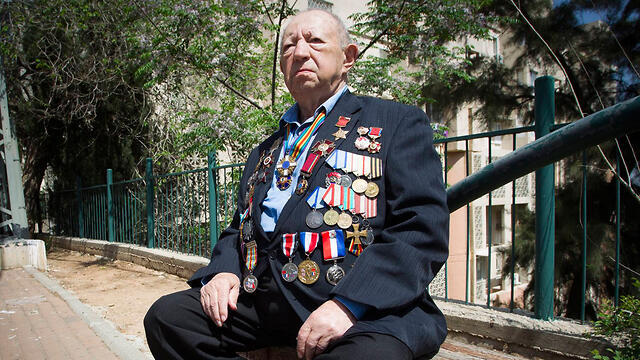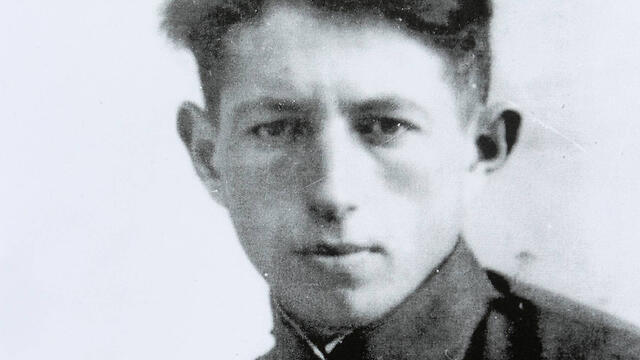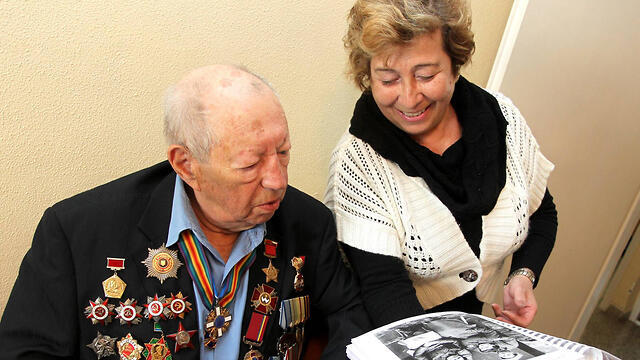Getting your Trinity Audio player ready...
Leonid Bernstein, a highly decorated battalion commander of partisans fighting the Nazis, passed away on Saturday in the northern Israeli town of Kiryat Ata; he was 98. In recent years, Bernstein lived in a small flat with no elevator and required a wheelchair to get around.
and Twitter
Bernstein was born in Ukraine in 1921 and served as a lieutenant in the Red Army after the Soviet Union entered the war against the Nazis. He was later captured in battle and managed to escape and go on to fight with the anti-Nazi underground against the Germans.
In an interview with Ynet five years ago, he told how he found work at a German train factory where he sabotaged equipment. Later, upon assuming command over a partisan company, and later a battalion, he dealt with mines and explosives and brought about the derailment of 44 Nazi trains.
He also took part in the liberation of Soviet prisoners in Slovakia and many of them joined his unit to continue fighting the Nazis.
During one of his missions, he describes how he was captured by the Germans but managed to escape and fled to a location in the forest where the Soviets airdropped fighters behind enemy lines. "we cost the Nazis a lot of losses and intelligence information we conveyed to the Soviet Air Force enabled them to bomb a clandestine German installation that served to test German rockets," he said.
That mission, his most significant, involved locating and the destruction of a V2 rocket plant. The V2 was the first ballistic missile that the Germans used to bombard London toward the end of the war.
Simon Shechter, a screenwriter at Metaphor, has been researching Bernstein for years and is preparing for a documentary film that will be supported by the Israeli Broadcasting Authority, Kan, and will be screened in about a year. He said that the Pozharsky battalion, which Bernstein commanded, located the production site while losing many fighters.
"He passed the exact coordinates to the headquarters of the Red Army. (British PM Winston) Churchill asked (USSR leader Joseph) Stalin in an unambiguous telegram to preserve the facilities and development laboratories of the V2 in order to allow the entire world to learn its secrets," he said.
"Bernstein had to smuggle himself and his fighters into the facility where they lit torches in an arrow shape in order to illuminate the weapons stores for the Soviet bombers," Shechter continued. "The production capabilities were destroyed but the laboratories and production lines survived. The information gathered at the site influenced the entire history of aeronautics and space exploration, and very destruction of the facility was the last straw for the V2, Hitler's last hope for victory."
Furthermore, Schechter describes how Bernstein led 5,000 fighters towards Slovakia and helped in the Slovakian revolt against the Germans. For his heroism, he was awarded multiple war decorations including the Medal of Excellence in Battle. He also received honorary citizenship in two cities in Poland and two cities in Slovakia.
After the war lived in Kiev, the capital of Ukraine. With the dissolution of the Soviet Union he headed the Ukraine-Israel Friends Association. In 1993 he immigrated to Israel and lived in Kiryat Ata. In an interview a few years ago, Bernstein criticized the treatment he received: "I never asked or will ask for help, but no one offered or was interested, that's how I live. I have been through a lot of medical committees and I am a certified injured war veteran without any benefits."
In recent years, Bernstein has lectured many times on Babi Yar (the site of a massacre carried out by German forces and local Ukrainian collaborators in which approximately 33,771 Jews were killed), about the war period in Ukraine and about the Holocaust. "The truth is that I have a feeling that it does not really interest anyone," he said bitterly four years ago. "Physically, I'm half crippled, but at least I've already learned to walk down the stairs and walk a little. This is a state of heroes, no? perhaps it's better that way. I know that nobody really needs me here," he said.
Bernstein was buried in Kiryat Ata on Sunday.




